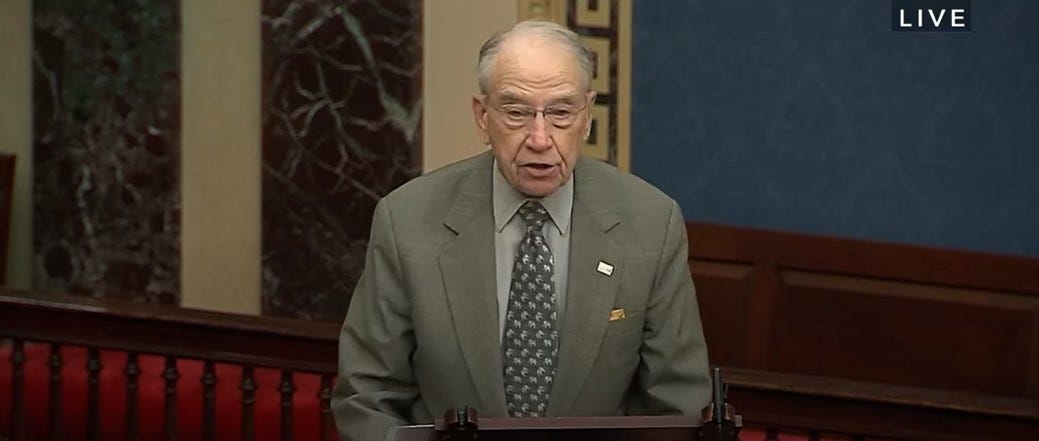Chuck Grassley opposed Barack Obama's recess appointments in 2012
Would he stand up to Donald Trump's in 2024?
As news reports say Donald Trump may try to bypass the Senate and its confirmation process in order to make recess appointments for some of his cabinet picks, it is worth remembering what Chuck Grassley had to say on the subject when Barack Obama was president in 2012.
Grassley, the top Republican on the Senate Judiciary Committee at the time, spoke about the wisdom of the Constitution’s separation of powers in a floor speech early that year.
According to his prepared remarks, he said:
“…the Constitution laid out a form of government designed to protect individual rights by resisting the concentration of power. This can be frustrating to those who would like a more activist government. Still, these features of our Constitution perform an important role in preventing one faction of Americans from dominating another.
“…not only is a concentration of power in the Executive Branch contrary to the founding principles of our nation, it is foreign to the realities of American civic life. With a country as large and diverse as ours, no one individual can claim to speak on behalf of all Americans. Our constitutional system, based on federalism, separation of powers, and checks and balances, helps ensure that each American has the opportunity to live their life as they see fit. …
“The voices of all Americans deserve to be heard through their elected representatives in Congress. That is what is at stake here. Those of us who were elected to represent the people of our state should do just that or we don’t deserve to be here.”
Grassley gave the speech a few weeks after Obama had made four controversial recess appointments.
Republicans complained at the time that the appointments were unconstitutional because the Senate was still in session. The White House disagreed, saying the Senate’s brief, “pro forma” sessions were a sham, and its recess appointments were valid.
The Supreme Court sided with the Republicans. “The Senate is in session when it says it is,” the court said.
Grassley praised the decision and chastised Senate Democrats. “Rather than protect the constitutional powers of the Senate and the separation of powers, they protected their party’s president,” Grassley said.
Now, it’s Grassley’s turn to decide whether he will protect the constitutional powers of the Senate when the president is Donald Trump.
Trump has been pushing Senate Republicans to allow recess appointments, and one of the potential options in his scheme is this: Using a little-known part of the Constitution that gives presidents the power to adjourn Congress, but only when both houses disagree about when they should go out of session.
The plan appears to require the House passing a measure calling for the House and Senate to adjourn; then if the Senate refused to go along, Trump could adjourn them both and proceed with his recess appointments.
Ed Whelan, a conservative legal scholar, calls it a “cockamamie scheme” that would “turn the Constitution’s appointment process for Cabinet officers on its head.”
He’s right. Alexander Hamilton, in the Federalist Papers, called this part of the Constitution an “auxiliary method of appointment” designed for times when the Senate was away.
In those days, Congress held relatively short sessions and there were long recesses in between, according to the Congressional Research Service. This is hardly the case today, and one would hope a Supreme Court that has been heavily basing its decisions on the history and traditions of this country would agree.
I have not seen any news stories reporting what Grassley thinks about this idea. But the Des Moines Register reported this week that his office issued a statement in response to the nomination of Matt Gaetz as Attorney General, saying the Senate Judiciary Committee would follow “regular order and let the committee process play out, just like any other nomination.”
I hope this means that Grassley would resist any attempt to bypass the Senate, but I have my doubts. Grassley has proved himself to be quite malleable when it comes to Trump.
Two examples:
In 2016, Grassley refused to move on Obama’s nomination of Merrick Garland to the Supreme Court to replace Antonin Scalia, because he said it was an election year. But in late 2020, also an election year, Grassley reversed himself and supported Trump’s nomination of Amy Coney Barrett to the court to replace Ruth Bader Ginsberg.
Then, in 2021 Grassley harshly criticized Trump for trying to overturn the 2020 election, only to sing a different tune later on.
Whatever happens, Iowans should not forget Grassley’s words from a dozen years ago:
“…even those who support this president's policies should not be so quick to look the other way. Once the walls separating the powers allotted to each branch of government are eroded, they will not easily be rebuilt.”
These are wise words, and they are every bit as valid today as they were in 2012.
Along the Mississippi is a proud member of the Iowa Writers Collaborative. Please check out the work of my colleagues and consider subscribing. Also, the collaborative partners with the Iowa Capital Dispatch, which provides hard-hitting news along with selected commentary by members of the Iowa Writers Collaborative. Please consider making a donation to support its work, too.





Gosh I hate to give Grassley credit for anything. Well done, pointing out his hypocrisy when it came to Supreme Court appointments. I have a feeling more hypocrisy is on the way.
Grassley is worthless.